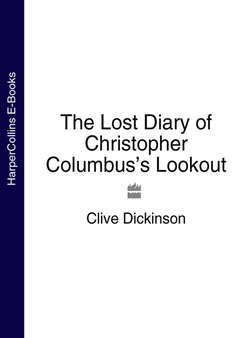Читать книгу The Lost Diary of Christopher Columbus’s Lookout - Clive Dickinson - Страница 4
MESSAGE TO READERS
ОглавлениеIt isn’t very often that unknown records of famous events in history are discovered by accident. However, this is exactly what happened when Clive Dickinson caught something much fishier than a fish on a recent weekend fishing trip.
After trawling up several old boots and a couple of sprats, Clive pulled a small wooden barrel out of the water. Inside were pages of rough paper, smelling faintly of tobacco and covered in childlike sketches of what seemed like life on a desert island. There was writing too – in Spanish – and, from Mr Dickinson’s rudimentary knowledge of this language from his frequent holidays in Spain, it seemed to describe a sea journey.
Mr Dickinson soon discovered that he had a priceless document in his hands. Although the name Christopher Columbus* did not appear on any of the pages, it was clear that the writing described the famous voyage Columbus led in 1492, across the Atlantic Ocean, to discover a new sea route to Asia.
Christopher Columbus had kept his own day-by-day account of the voyage, but his original journal has been lost over the last 500 years. Could this new discovery be the only surviving record of that great event?
Using the Internet, Mr Dickinson found two experts on medieval voyages who agreed to examine his find (for a very reasonable price, he says). Dr Miles Away, an Alaskan academic, and the Spanish historian Don Believavor D’Ovid confirmed that the pages in the leather folder were indeed written in 1492 by a member of Columbus’s expedition, who sailed with him on the flagship, the Santa Maria. His duties are a little unclear, but he appears to have spent some of his time as a lookout.
Now, after five centuries, extracts from this remarkable first-hand account have been translated and can be published, recording one of the great turning points in world history, when the Old World and the New World met for the first time.
*‘Columbus’ is a Latin version of the discoverer’s name, which was written differently at various times of his life, depending on the country in which he was living. In Genoa and Portugal he was called Colombo. In Spain his name was written Colón. It is unlikely he ever knew himself by the English name, Christopher Columbus.
